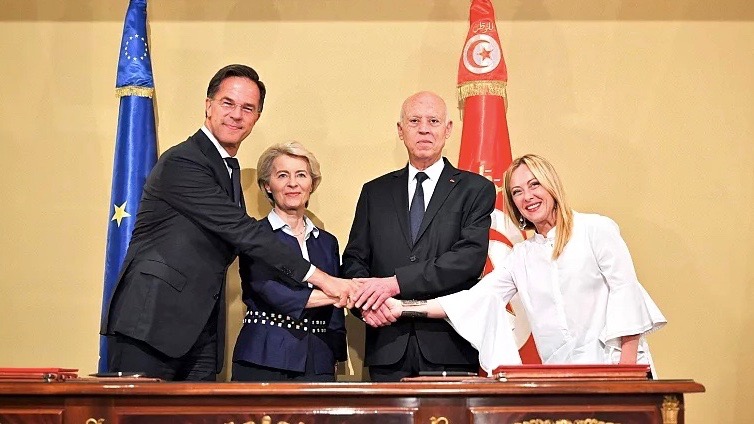Human Rights Watch, on Thursday, September 28, condemned the migrant deal reached between Tunisia and the European Union (EU), calling it “terrible for human rights.” The agreement was initially reached in July this year, as per which the EU will give USD 135 million to Tunisia to monitor and prevent migrants and asylum seekers from Africa from illegally crossing over to Europe. Last week, the EU announced going ahead with the deal and released EUR 67 million to Tunisia, amid what the HRW said was a significant increase in the number of boats setting sail from Tunisia towards Europe in the last few weeks.
Around EUR 42 million of the transfer will reportedly go to Tunisia’s coast guard and navy. Along with the army and other security forces, they have been accused of grave human rights violations and abuses against Black African migrants.
HRW noted that the EU had decided to release the funds despite the “absence of any specific human rights guarantees for migrants and asylum seekers, or any indication the EU has evaluated whether the funds would make the bloc complicit in abuses..” It also criticized the EU for its “obsession with sealing its borders over saving lives enables partners like Tunisia to not only go unchallenged for abuses they commit, but to also pressure the EU for more financial aid.” It highlighted that several European politicians, including the EU’s diplomatic chief and Germany’s foreign minister, had expressed reservations about the deal going through without the necessary human rights conditions.
HRW has also expressed concern over the increasing racist and violent treatment that migrants from other African countries are facing in Tunisia. This includes violent attacks on areas they reside in, arbitrary detentions, and forced evictions. In recent months, Tunisian security forces have expelled more than 1,300 Black African migrants, including children, to areas adjoining the country’s borders with Libya and Algeria. The expelled migrants were deprived of food, water, and medicines for weeks and were only evacuated after a huge outcry. Libyan authorities later noted that during this ordeal, at least 27 migrants died while being held unlawfully at the border.
HRW also condemned Tunisian President Kais Saied’s use of extreme hateful, inflammatory, and racist language against the migrants, calling their arrival an invasion, which has directly contributed to the increasing anti-migrant and anti-Black sentiment in Tunisia.
HRW in its statement said that the EU should “guarantee that Tunisia meets basic human rights benchmarks before sending a single Euro-cent to entities with a demonstrated poor human rights record. Not doing so risks implicating the EU in further fueling serious abuses and causing immense suffering.”
It noted that the EU ombudsman had asked the EU commission two weeks ago whether it had carried out a human rights assessment before reaching the migrant deal with Tunisia, and how it planned to monitor its implementation. So far, the EU commission has ignored the ombudsman’s questions.
Additionally, the deal has gone ahead despite the Tunisian government disallowing an EU delegation’s visit last week. One of the delegation’s members, French member of the European Parliament’s committee on foreign affairs, Mounir Satouri, called it a “slap in the face to parliamentary democracy.”





